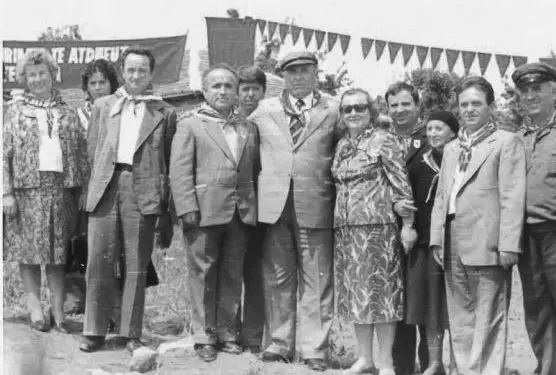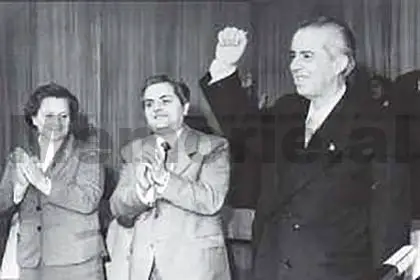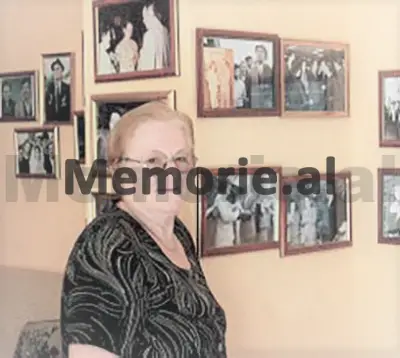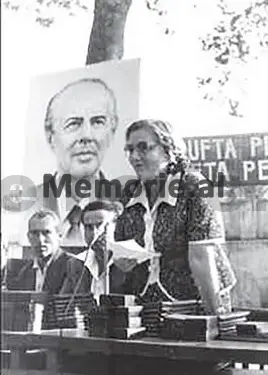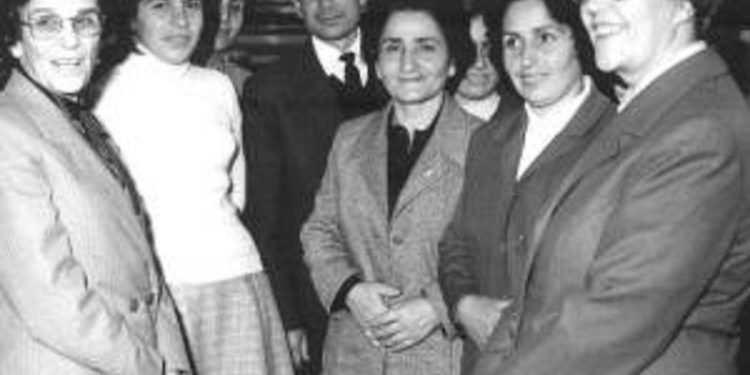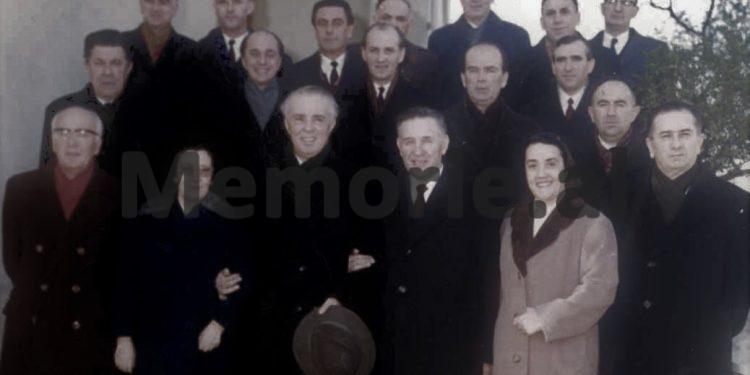By Elisabeta Ilnica and Dilaver Xhelili
The first part
Memorie.al / From lathe, to vice president of the Presidency of the Presidium of the People’s Assembly. A remarkable rise, but it was not the only one. Mine Guri, one of the most powerful women in the dictatorship, tells her life, from her first job at the age of 12, to her gradual ascent in her political career. Guri also tells about the “friends” of the Party, Nexhmije Hoxha, Vito Kapo, Fiqrete Shehu, etc. A special stop at Mehmet Shehu, with whom he had a fight a few days before he committed suicide. She was among the most popular officials in the last two decades of communism, but the most unknown, for the secrets she knows about the former leadership. The First Secretary of the Party Committee in Kuçovo and Berat, MP from 1970-1990, the first female vice-president of the Presidium of the People’s Assembly for 8 years, but also the vice-president of its Presidency, Mine Guri, is the first time she speaks publicly .
An exclusive interview from her home in Berat, on the second floor of an old apartment, full of enlarged photographs of the former leadership of the Party of Labor of Albania. Most are fist up, only the characters that have surrounded Mine change. From Enver and Nexhmije Hoxha, Ramiz Alia, Lenka Çuko, Gogo Nushi, Haxhi Lleshi, Hysni and Vito Kapo, etc., to the photos of 12 thousand girls and women, in the former Textile Factory “Mao Ce Dun” in Berat, where she was director for seven years, in parallel with the functions in the Presidium of the People’s Assembly.
Her entire career and friendships are hanging on the walls of this apartment, and what is not, she tells us herself. From the vicissitudes of being a minor as a lathe worker at the “Enver” factory in Tirana, to the highest political and party heights. A long career that never required higher education. To become a deputy, not even high school. He was admitted to the Assembly at the age of 7 and as he had three small children, he attended high school at night.
After a few years, she added two more children to her family, but most of all she increased the confidence of PPSh members and the women of the leadership in the former “Blok”. Her house was already visited by the highest communist leaders, while cabbage with nettles was her specialty and Ramiz Ali’s favorite. And, before we get to the stomach of the former leadership, Mine Guri starts on his own, cursing and praising fate at the same time…!
Ms. Mine, why do you curse him?
Because everything we built for decades was destroyed, with the sweat of our brows and not with the energy and oil of modern machines. But I praise fate more.
And why do you praise him…?!
Because I have a wonderful husband, who supported me throughout my career, I have 5 sons, 5 nieces and 2 nephews. I have many friends who did not forget me during the difficult years after communism fell. And yes, I thank fate so much that I happened to be in Tirana, when the emancipation of women began in the 50s.
Where were you before these years?
In a very deep village, in Frashër, I had the surname Kotorri from my father. I fell seriously ill and my uncle, who lived in Tirana, took me there to cure me. After I recovered, my uncle felt sorry to send me back to the village and kept me there. He even tried to hire me. The “Stalin” Textile Factory was opening in Tirana, and they were looking for female workers. I also showed up, but after 1 week of work I was fired, even though I was a lady.
Why were you fired?
I was a minor, only 12 years old, I had just finished 7-year school. The Soviets who were in charge at that time, got mad and put their hands on their heads when they found out my age. They recommended me to do some school or course. So my uncle sent me to a 2-year lathe course. That course served me a lot, because with the great desire I had for work, specialization and correctness, I immediately fell in good eyes. In 1951, I was immediately employed at the “Enver” plant, while over the years, I became interested in the party.
Where did this interest for the party come from?
At the “Enver” factory, there was a time when party members held meetings and spoke to us. I liked what they said, especially about women.Tirana was very fanatical, don’t forget that the women of Tirana still wore many veils, went out only accompanied from home and their employment was like a revolution. We, the women, felt it and that’s why we loved the party more.
However, my greatest desire to become a party member came to me after Enver Hoxha’s visit to the factory. I was moved, surprised by his words. After that meeting, I started working harder and reading more about the party. I applied to become a member and after a year as a candidate, I had two joys. In 1961, I became a party member and got engaged.
Engagement with love?
With matchmaking, but years and children show that it was also love. My husband, Kadriu, was a student aviator in the Soviet Union. His family lived in the village of Kosova in Lushnja and our close people arranged the matchmaking. When he returned, we only met once, but we immediately liked each other and announced our engagement. Months later, we were married, in October 1961. We had a simple wedding and immediately went back to work.
You didn’t rest at all?
Only 5 days in total, including the wedding. We spent these days in my husband’s village, near his parents. With people coming in and out, it wasn’t a vacation. We went there out of respect for our parents. As a couple, we were given a room in the Officers’ House in Kučovo, as Kadriu had started work there, in aviation.
And you, unemployed?
Yes, out of work for just a few days. With the work file in hand, I appeared at the Kuçova Party Committee. I left the documents there and they arranged a meeting with Pilo Peristeri, who at that time was the director of the Mechanical Oil Plant. He asked me where I came from, and when I told him that I had worked at the “Enver” plant in Tirana, he hired me directly.
In what position?
As a pumper. At that time, a new ward was created and I did the pumps there. I was a specialist and meanwhile, I also taught young women who were employed there and had no experience. For 10 years, I have done this work, while the Party had appointed me to deal with the emancipation of women and had given me higher functions.
How much higher?
I had already become the first secretary of the Party Committee of the Kučova region. A rise to duty, but also an early morning rise. I had become more of a child, and in order to do the housework, the party work, and the factory work, I had to make big sacrifices of sleep. There have been cases of voluntary work or, when I was in the military, I went 48 hours without sleep. My dedication to work and the party has been maximum. But the party also rewarded me.
How did he reward you, increase your salary?
What salary? No, no, it was not salary related. I told you, he made me the first secretary of the party in Kučovo. It was a great moral appreciation for me, an appreciation that no amount of money in the world would compensate me for, no matter how much I received. The party knew this, it was not for nothing that they proposed me, a lathe worker, to become an MP.
Do you say “party” all the time, any specific name? Who made this proposal to you?
I really don’t know. In 1970, at a meeting of the Party Committee, it was communicated to me, but I don’t know whose mind it was.
Hadn’t you asked yourself to become a deputy?
No at all. I told you, I was even very busy with the party in Kučovo, family, work and in the meantime I attended school at night.
High school?
High school, because I was only with the 2-year lathe course. I had started the High School of Oil Mechanics in Kuçovo and I went 3 times a week, at night.
So, you went to the Assembly when you still had the 8-year diploma and the course certificate?
Yes, and as far as I know, I was not the first nor the last. Back then, it wasn’t just a high school diploma that made you a member of parliament. Today it is definitely needed, but it is also easily bought. So how much is a degree really worth? The most important criterion was honesty in every field, from family, work, society, etc.
Over the years, I had proven that I was a distinguished worker, that I exceeded the norms and read constantly, despite the fact that because I started a family, I could not continue school. Even, my delegation to the Assembly as a deputy, was a stimulus for thousands and thousands of girls, all over Albania, who, like me, were workers and wanted to move forward.
How do you remember your first day in the Assembly?
Even today when I remember it, I shudder. Endless emotions. When I saw Enver Hoxha come there, I felt very lucky. Eh, I got lucky again. But I wasn’t the only one who felt that way. I remember other friends who had the same feelings and told me the same thing. I had dreamed about that day and it took me 20 years.
Do you remember what you were wearing?
A very simple beige suit. As for taking the photo as a member of the Assembly, I borrowed a black T-shirt. I was told that when you go out in a black shirt, the photo comes out better.
I believe you also had makeup on, since you were going to be in the photo?
No, I never did makeup. Neither in Kuçovo, nor in the Assembly. I was ashamed, I wanted to be as simple as possible. Also, I had three children in the meantime and I had no time for myself.
Did you ever take your children with you to the Assembly?
Yes, because my third son was very young, still breastfed. I had to take it with me and several times, I left it to the driver or a relative. When we had minutes of rest, I would leave the Assembly and give him a drink. This is how I acted with my other sons, who were born to me later, as in the Assembly, or in the Party meetings in the various districts.
Were you paid well as an MP?
There was no fixed salary. We were paid 300 lek a day.
Not bad for the time…
Don’t forget, 170 Lek was used only for the hotel. In order to save some money to buy something for the children, I took the bread with me. This is how the other female MPs also acted. We entered the hotel after finishing work in the Assembly and there we opened bread, rice, olives, tomatoes in summer and onions in winter. Then, it’s not like they came to Tirana every week. The Assembly met once every 2-3 months and only for exceptional cases, it was called out of order. During this time, we prepared a lot and had to discuss.
What did you discuss the most?
For what I knew most. For the oil in Kuçovo and the textile industry in Berat.
Have your discussions ever caused debate or conflict?
I had an incident with Abdyl Këllez, deputy prime minister and chairman of the State Plan Commission. It was my strongest opposition, both in terms of arguments, but also in terms of courage. I was opposing the deputy prime minister. He had returned from a specialization in China and came to Kuçovo with new investment ideas for oil, but which were very expensive. It required the construction of several cement, lime, brick, etc. plants, i.e. a chain of new factories.
He presented these thoughts to the Assembly, at a time when we did not have money for simple spare parts.Knowing the situation well from the inside, having been a worker for years, I argued to him that he was wrong, and when I finished, I was applauded for several seconds. I returned to Kučovo, where the echo of my speech had gone there too, and only a few weeks later, time showed that I had been right.
In which way?
Abdyl Këllezi and several others were dismissed from state duties. After the 7th Plenum of the Central Committee of PPSh, held on May 26-29, 1975, Këllezi was accused of “hostile activity and sabotage in the construction of major works”.
Do you think it was your speech that led to this charge?
Not at all. My speech was quite natural and logical because I knew the terrain and the tools in Kuçovo, but I had no information about these sabotages. I have to remember again, I continued to work in the factory, even though I was elected deputy. In fact, in 1975, after this discussion in the Assembly, Enver Hoxha came for a visit there and almost did not recognize me. I was waiting for her as an equal with my female colleagues, and after introducing myself, she told me: “When I come here next time, I want this factory full of women.”
From sedra, I was forced to first convince my closest friends to be employed there. Day after day, I went from house to house to convince the girls and women, telling them, at the same time, that it was Comrade Enver’s order. At first I had difficulties, as the mentality for employing women was still far away, but a year later, I managed to fill the factory full. I filled it, but then I had to leave.
Why did you leave?
After the attention I attracted for my courage in the Assembly and the work for the emancipation of women, in 1976, the secretary of the PPSh Central Committee, Hysni Kapo, called me and proposed me as the first secretary of the Party Committee in Berat. I accepted this task and at the same time I moved with my house here, where I am to this day. Finally, I got an apartment and my 5 sons had more space.
I thanked Comrade Kapo for the trust, as he told me never to make decisions without asking. I remembered this sentence well, because sometimes when I wanted to say something or when I argued, I stopped. I went and asked expert people about the issue, then I was ready to give professional answers. I was also involved in Berat, with the emancipation of women, but over the years, I was feeling tired. Therefore, one day I thought of resigning as a member of parliament.
And you made this resignation?
Orally, yes. In 1982.
Did you present it to Enver Hoxha?
No, the resignation was submitted to the Presidium of the People’s Assembly. In 1982, Ramiz Alia had just been elected to the position of the chairman of the Presidium. I went and met him after the election. I begged him to understand my resignation, because with so much work I had in Berat and 5 boys at home, including my husband, it was very difficult to prepare for the Assembly. My friend Ramiz laughed and told me to go back to Berat calmly, that he would solve this issue very quickly.
Did Ramiz Alia accept your resignation?
Not only did he not accept it, but after a few days, I received the news that I had been elected vice president of the Presidium of the People’s Assembly. With this, my function was really increased, but also the work to prepare even better for the Assembly.
Didn’t you try to contradict him again?
I don’t know how much you realized during the conversation, but I used to be very shy by nature. When I met Ramiz Ali again, I told him pleasantly that; “What did you do to me like this”, but with the appointments he gave me afterwards, I saw that it was pointless to oppose him.
What appointments?
In addition to being the vice-president of the Presidium, I was also appointed vice-president of the Presidency of the Presidium. They were two very high positions, among the highest that a woman could achieve. This was a lot for me and I never expected it. And after two more years, in 1984, I received my next appointment, which was also the task I loved the most. I became the director of Berat Textile Factory.
Why did you like this directorship more than being a deputy and vice president?
Because it was directly related to what I had been working on all my life, the emancipation of women. The Textile Factory was a giant of production, only by the hands of women and girls. Fully 12 thousand women!
How can a woman lead 12 thousand others?
Only one woman succeeds thousands of others… (laughs). Before I ran the Berat combine, this giant industry had very low rates and girls and women were not committed. Just a short time after I was appointed, I worked with the adjacent ones, advised and taught them, until I declared the Textile Combine in Berat “Hero of Socialist Work”. From the deficit, we became the first in the export of textiles.
When there was so much textile production in the country, why did Albania suffer from clothing shortages?
I was put in charge of the Combine to produce as much as possible, not to find production management policies. I believe that I have performed my duty very well.
Someone didn’t perform well then…?!
It requires you to definitely find a culprit, but the culprit doesn’t have a name. It’s a whole system. Every type of system, even the one that is claimed to be the best, has its faults. I accept the faults of my system, but not the abuses of untruths that are made in its name. If there is democracy, this system should also admit its faults.
Are you against democracy?
I have never been against democracy. I was among those who supported Ramiz Ali, in 1990, to start paving the way for democracy. But, not the path of destruction. Not to destroy in 24 hours, what we barely built in decades. Democracy in Albania came insidiously and as such, it is not a democracy.
As a member of parliament for 20 years and with the function of the vice president of the Presidium of the People’s Assembly, I believe that you have had many friendships with the senior leadership. What are some of them?
When I first set foot in the Assembly, I didn’t know anyone. Over time, I became good friends with all of them. I know more about my career and the appreciation I have had thanks to Ramiz Ali and Hysni Kapo. They have had a lot of faith in me.
What about Enver and Nexhmije Hoxha?
Of course, I have some episodes with Enver Hoxha, which pushed me to work harder and over the years, we became friends. Unfortunately, he died, but then his friendship with Nexhmija strengthened. I also had very good friends Fiqrete Shehu, Vito Kapo, Eleni Pashko, Naunka Bozo, Sofi Çuedar, Lenka Çuko, Themie Thomain, etc.
Which of these was the best dressed?
I would give the first place to Vito Kapo. He had a very beautiful style of dress. It amazed you with its taste, and it was not a matter of having too much, but of how it was combined. I was amazed when I looked at it. Of course, I have always looked at him with admiration, not envy.
What about the houses of these deputies, have you been?
I have also been to their houses. I would still say that, even at home, Vito Capo had style.
More style than Nexhmije Hoxha?
Look, I don’t understand why it is always exaggerated when the name of Nexhmije Hoxha is mentioned. I have been to her house and the couches were made of basme, while there were simple families who had them with damask, or a more expensive piece. Nexhmije Hoxha dressed simply and also kept the house. Clean to the max, but also modest in clothing and furnishings.
A little above you mentioned Fiqrete Shehu, you said that you had her as a friend. What type was she?
He was kind and bitter at the same time. He would throw some words at him, but I, at least, have never misunderstood him. We had a good time and our children played together. I was at her house and she was at my house. We ate each other’s bread. It is not for nothing that I mentioned her as a friend.
Would you say “friend” to the late former Prime Minister, Mehmet Shehu?
I would only say “may his soul rest in peace”, as I have told him in the past. I got along better with Fiqreti than with Mehmet, because he was more youthful. He was inquisitive and, for the sake of truth, he knew the economy very well and you couldn’t lie to him. Only, sometimes it was very brutal. He used to give you cold water and only when he saw that you surrendered, he would treat you with good things.
Have you ever been busy with that?
I’m really busy. About 20 days before the suicide.
Suicide or murder?
Suicide, I’m convinced. / Memorie.al
The next issue follows




